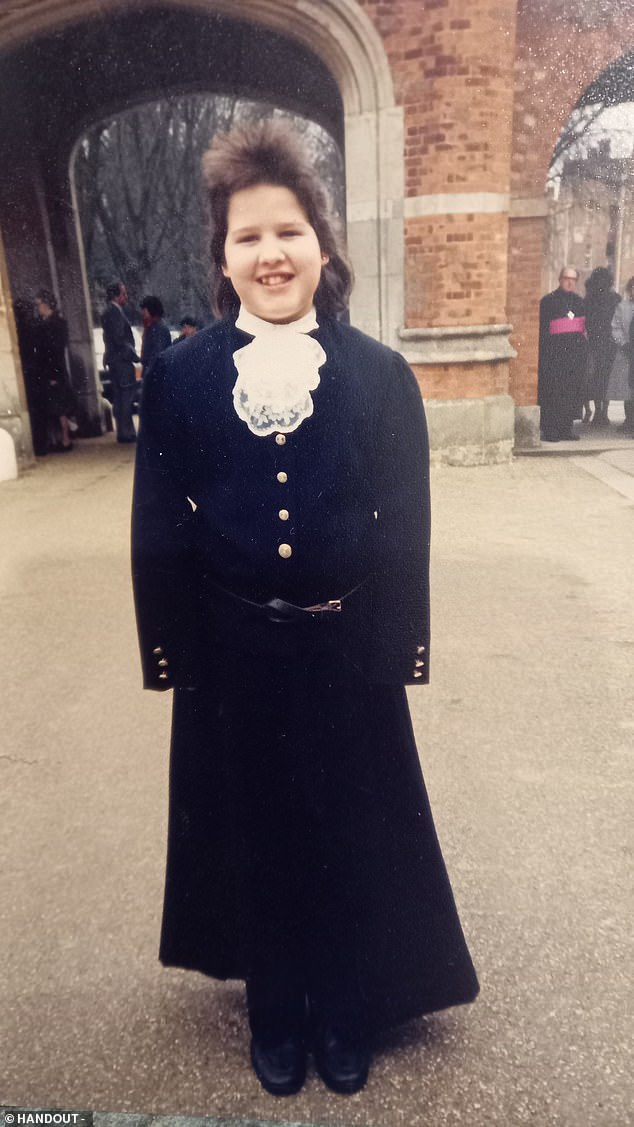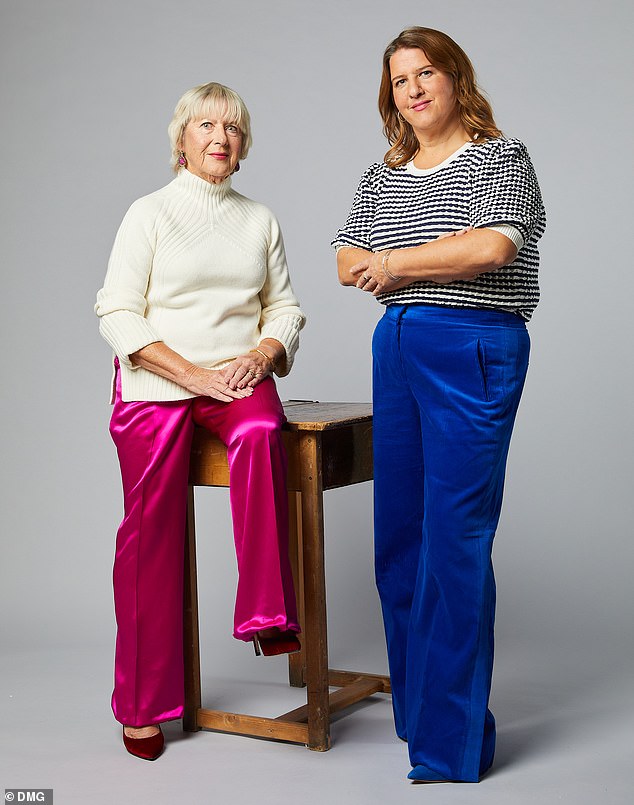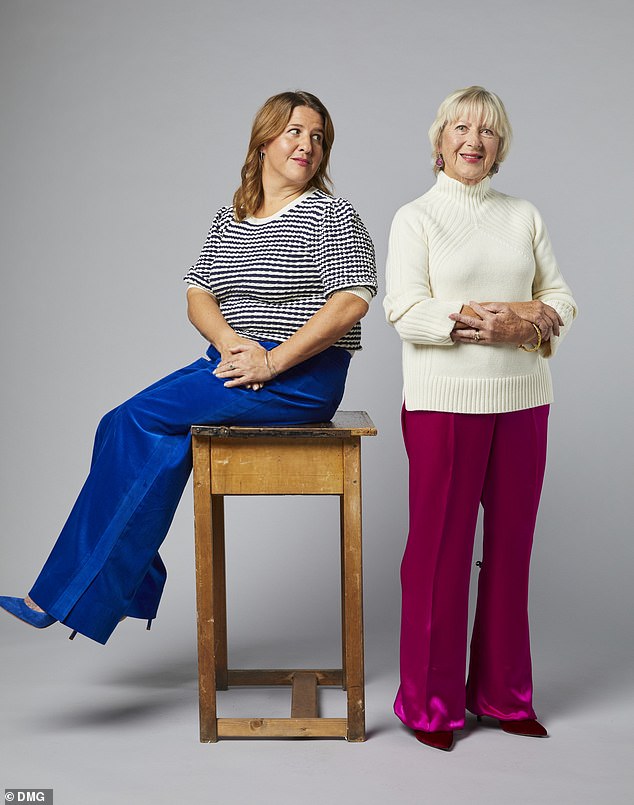One night shortly before my 40th birthday, I suddenly found I couldn’t stop sobbing.
I was in an unhappy marriage, and the pressure of being a working mum to three young children had been building for a while, but I was bewildered by what was happening to me. In fact, I was in the throes of a breakdown.
My husband tried to comfort me but was unable to; the person I really needed by my side was my mum. I called her, and she drove for over an hour to pick me up, before taking me back to her home where she looked after me as if I were a child.
I was hugely grateful that she was there when I needed her — yet the experience was bittersweet. It struck me that she provided my adult self with the comfort she hadn’t been able to give me when I was a child who needed her far more.
Years before, she had sent me away to boarding school, where I was forced to grow up without her.
Boarding school is seen by many as a privilege — it costs vast sums of money and is the start given to so many of our ruling classes —but I came to view it as a punishment.
Boarding school is seen by many as a privilege — it costs vast sums of money and is the start given to so many of our ruling classes —but I came to view it as a punishment. Amelia with mother Janet
And I’m not alone. A new book, The Psychological Impact Of Boarding School: The Trunk In The Hall, looks at ‘boarding school syndrome’, said to include anger, depression, anxiety, failure to sustain relationships, fear of abandonment and substance abuse.
Despite acknowledging well-documented cases of children being ill-treated at school, the authors said ‘boarding schools cannot be held totally accountable for some of the psychological problems encountered’.
They claim the worst after-effects were seen in the pupils who had felt most rejected by their parents.
‘Our research suggests that family relationships and parenting are key to how children experience boarding school,’ explained Professor Susan McPherson, of the University of Essex.
I agree that parental relationships are key, though we should not let the institutions themselves off the hook. In my view, there is no healthy way to board because children should never be removed from their parents at such a young age.
I boarded for five years from the age of 11 and, far from feeling fortunate or grateful for the sacrifices Mum made to send me there, I resent the wedge it drove between us.
It’s not only my relationship with my mum that was affected; one of the reasons I married my ex-husband was because I was terrified of abandonment and felt confident he would never leave me.

A new book, The Psychological Impact Of Boarding School: The Trunk In The Hall, looks at ‘boarding school syndrome’. Pictured: Amelia at Christ’s Hospital in Horsham
When our marriage ended I had to face those suppressed childhood feelings of being on my own again. I also believe I struggled as a mum because I had no template for ordinary family life.
This might sound extreme. But in my work as a therapist I have met hundreds of former boarding school pupils who similarly believe their time away from family blighted their lives.
It wasn’t until many years after finishing my studies that I learned about ‘boarding school syndrome’. The theory is that if children are forced to suppress their emotions, they manifest in other ways. Sometimes physically.
Beside my prison-style metal bed at boarding school was a bucket I vomited into each night of my first half term.
None of the teachers ever suggested this might have been a reaction to the distress of being separated from my family. We had no contact with our parents for the first three weeks to ‘break the attachment’.
Many years later, I was shocked to trace many of the problems that had haunted me for years — from an eating disorder to the sorts of relationships I was drawn to — back to that period of isolation.
When I started at Christ’s Hospital School in Horsham, West Sussex, in 1986, having read Enid Blyton’s Malory Towers, I imagined it would all be adventures and midnight feasts. Mum was excited for me, too. But the reality was very different.

In my work as a therapist I have met hundreds of former boarding school pupils who similarly believe their time away from family blighted their lives
Up until that point, I had been a happy child with a close, loving relationship with my mother. But there was no emotional outpouring when she dropped me off for the first time.
My older brother had already been there for three years, so it was a familiar environment. I was whisked away by the other girls to be shown around. A well-known distraction tactic.
During those early weeks with no contact, I was distracted by a busy schedule and forced to switch off my emotions. Expressions of ‘weakness’ were ridiculed. It was only with hindsight that I realised the vomiting was symptomatic of my response to the grief I felt.
Even after those first three weeks, it was tricky to call home. There was a public payphone in the corridor, yet it was shared by 70 girls. Weeks would pass without phone contact.
I would lie awake at night gripped by fear that something had happened to my mother, but be unable to call and check she was OK. Considering my father had died from a heart attack at only 34 when I was one, you can understand my paranoia.
My peers were in a similar position but we never discussed it. It was like home life didn’t exist. Similarly, when it came to telling your parents about life at school, there existed a code of silence.
We were kept too busy to think. A full day of lessons was followed by three hours of ‘prep’, then sports, music and theatre practice. It’s a method that leads to burnt-out adults who don’t know how to switch off.
During the holidays, Mum continued to work long hours as an estate agent and I had no local friends. Ex-boarders often don’t know how to answer when people ask where we’re from — many feel utterly rootless.
I didn’t question Mum’s absences during the holidays. Our relationship had become superficial; I had stopped sharing my feelings and experiences with her. Mum wasn’t cold or unloving but she was so busy there was little time or space for me.
I left after GCSEs when teachers told me they didn’t think I was ‘academic enough’ to stay on for A-levels.
I developed bulimia aged 17; binging and purging gave me the sense that I at least had control over something in my life. Unknown to family and friends, it continued until I was 24 and finally got therapy.
Though Christ’s has no doubt changed since my time there in the 1980s, back then there were far darker undercurrents that made my time at school particularly traumatic. It was an open secret among the pupils that some male teachers would take ‘favourite’ pupils back to their houses in the evenings and ply them with alcohol.
Although I was never targeted, it was no surprise when as many as five members of staff, including our school chaplain, were convicted of sexual abuse a few years ago, following complaints from more than 22 former pupils, with offences spanning from the 1960s up until 2001.
Yet it wasn’t only these behaviours that left me with a lasting legacy of pain — that was down to feelings of abandonment.
During my 20s, I began to feel real anger towards Mum. I didn’t feel loved, or that I mattered to her. Many ex-boarders I know felt the same, though few admitted this to their parents. It was only in therapy in my late 20s that I realised my eating disorder was the result of having learned to suppress my emotions.
Soon after, I told Mum about my bulimia and she was horrified by the link to boarding school, wishing I’d told her of my unhappiness.

During my 20s, I began to feel real anger towards Mum. I didn’t feel loved, or that I mattered to her
She was shocked, too, when she read about the teachers’ abuse of pupils in the papers when they were prosecuted. Yet she has never apologised for sending me there.
Meanwhile, raising my three children, all of whom go, or went, to the local comprehensive, has been challenging because I had no blueprint for it. I didn’t understand why our daughters thought it was OK to while away their evenings doing nothing, or begged to stay out until 9pm.
But it was watching my mum lavish them with attention when they were babies that I found particularly challenging; I wondered why she hadn’t doted on me.
Thankfully I didn’t struggle to bond with them — neither have I been cold or detached. In fact, it’s the other way round; I had a heightened anxiety about them feeling rejected to the point that they more likely felt a little suffocated by me.
When my eldest daughter went to Edinburgh University in September, I found some of my old abandonment feelings resurfacing. The fact that she’d chosen somewhere so far away from our home in Brighton compounded the sense of rejection. I had to keep reminding myself that she was 18 and it was right for her to fly the nest.
My mum adores her grandchildren, and they her, but, still, if she comes to visit, we are slotted in, between all her other activities. We don’t just ‘hang out’ with each other, in that easy way that comes from growing up in your family home. Everything’s slightly formal, appointments are made, there’s no ‘dropping in’.
That’s why it meant so much when she really stepped up after I separated from my ex-husband, seven years ago; we have been much closer since I faced up to the years of issues that stemmed from being sent away.
I know from the many ex-boarders I’ve counselled that parents can be very defensive about their decision. This is why lots of people don’t start processing the damage done until their mothers and fathers are dead.
I would like my mum to recognise that, given what she knows now, boarding school wasn’t the best environment for me.
At 48, an apology wouldn’t change my experience, but it would be recognition that there are serious costs to this type of education.
Amelia’s mother Janet Jarrett, 78, lives with her second husband near West Byfleet, Surrey. She says:
When I had the chance to send my son and daughter to boarding school, I was delighted. I was a young widow, working all hours and sometimes six days a week as an estate agent to make ends meet.

Amelia’s mother Janet Jarrett, 78, lives with her second husband near West Byfleet, Surrey
But with the help of bursaries from Christ’s Hospital School and money from my mother and godmother, I only had to contribute a few hundred pounds a year. I felt very fortunate.
I had been a day pupil at a private school that also had boarders, and we were very much looked down upon by the girls who lived in. My mother who, like me, was widowed at a young age, couldn’t afford for me to board.
So I was delighted to get Amelia and her brother into Christ’s Hospital. I wanted to give them the experience I hadn’t had.
The benefits of a boarding school education include learning, from an early age, to stand on your own two feet.
Boarders don’t have the outside distractions that a teenager at a day school has, so it’s more disciplined and I’m sure they gain academically. They have a wider curriculum too, with lots of opportunity to pursue theatre, sports and music.
As far as I knew, back then, my children were both quite happy. But I’ve since discovered from talking to Amelia as an adult that it’s an unwritten rule among boarders that they don’t report back to their parents.
Amelia has told me in recent years about things that I’d have caused a rumpus and complained about to her headmaster if I’d known at the time. For example, one of the teachers would show slides of his nudist holidays. And I was horrified to read about the teachers who were abusing children while mine were at the school.
But, at the risk of sounding heartless, while I hated the thought of my children going back to school after the holidays, once they were there, I breathed a sigh of relief because I was working full-time, so it made my life easier.
I’ve never had doubts that boarding school was the best place for my son, with no father figure at home. And with her brother already there, Amelia seemed keen to join him. But had I not had the need to return to work, it would, of course, have been preferable to have had both my children at home.
It was enormously distressing to hear that Amelia was frequently unhappy at school. I really wish she’d told me at the time and maybe I could have taken steps to help her through any problems.
I realise there’s an awful lot of things she and I missed out on. Throughout her adolescence, I felt somewhat superfluous, I suppose, as her needs all seemed to be met by the staff and her fellow pupils.

Mother Janet says she has grown much closer to Amelia since she became a mum herself
I do feel guilty to a certain extent because the time I spent at work deprived me of time with Amelia when I might have picked up signs of distress.
Amelia and I have grown much closer since she has been a mother herself. My husband and I adore my granddaughters and we have loved being part of their lives.
Would I have sent her to boarding school, knowing what I do now? Possibly not. Of course, there are numerous benefits — do these outweigh the negatives?
I’m not sure. After all, I never boarded myself. But I do know I would have thought a lot longer about the decision.
Interviews by Helen Carroll
- What were your experiences of boarding school? Email us at [email protected]

